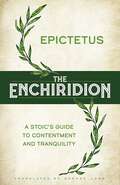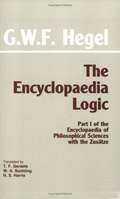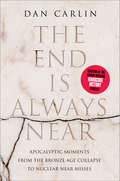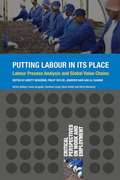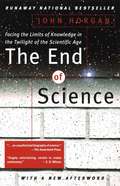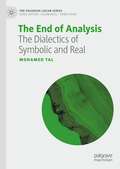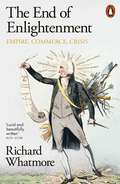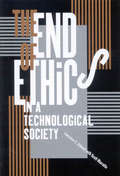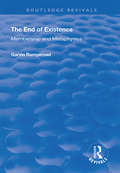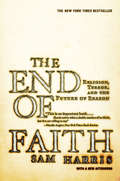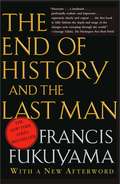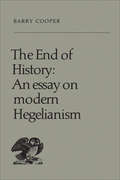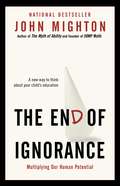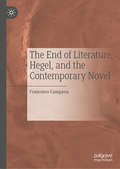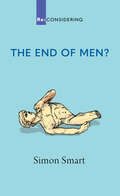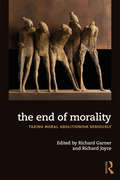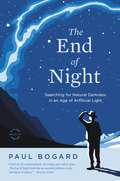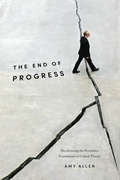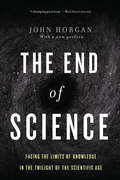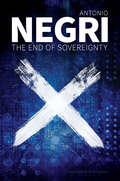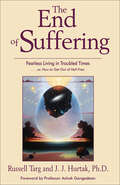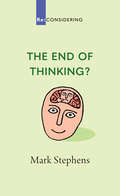- Table View
- List View
The Enchiridion: A Stoic's Guide to Contentment and Tranquility
by EpictetusThis lovely hardcover keepsake offers the timeless precepts of one of the most important Greek Stoic philosophers. Epictetus (ca. 50–ca. 130 CE) was born into slavery and had a permanent physical disability. After attaining his freedom, Epictetus spent his career teaching philosophy and advising a daily regimen of self-examination. His pupil Arrian later collected and published the master’s lecture notes as The Enchiridion, or Manual. Full of practical advice, this volume offers guidance for those seeking contentment, happiness, and tranquility in the modern world. Through the principles found in The Enchiridion, we learn that true freedom can be achieved by taking control of our thoughts and actions through self-awareness rather than trying to change events beyond our power. This enduring counsel on how to live follows maxims that have set generations of readers on the path to happiness and makes a wonderful gift for any occasion.
The Encyclopaedia Logic with the Zusätze: Part I of the Encyclopaedia of Philosophical Sciences
by G. W. F. Hegel W. A. Suchting H. S. Harris T. F. GeraetsThe appearance of this translation is a major event in English-language Hegel studies, for it is more than simply a replacement for Wallace's translation cum paraphrase. Hegel's Prefaces to each of the three editions are translated for the first time into English. There is a very detailed Introduction translating Hegel's German, which serves not only as a guide to the translator's usage but also to Hegel's. Also included are a detailed bilingual annotated glossary, very extensive bibliographic and interpretive notes to Hegel's text (28 pp. ), an Index of References for works cited in the notes, a select Bibliography of recent works on Hegel's logic, and a detailed Index (16 pp. ). The translation is guided by the (correct) principle that rendering Hegel's logical thought clearly and consistently requires rendering his technical terms logically.
The End Is Always Near: Apocalyptic Moments, from the Bronze Age Collapse to Nuclear Near Misses
by Dan CarlinThe creator of the wildly popular award-winning podcast Hardcore History looks at some of the apocalyptic moments from the past as a way to frame the challenges of the future.Do tough times create tougher people? Can humanity handle the power of its weapons without destroying itself? Will human technology or capabilities ever peak or regress? No one knows the answers to such questions, but no one asks them in a more interesting way than Dan Carlin.In The End is Always Near, Dan Carlin looks at questions and historical events that force us to consider what sounds like fantasy; that we might suffer the same fate that all previous eras did. Will our world ever become a ruin for future archaeologists to dig up and explore? The questions themselves are both philosophical and like something out of The Twilight Zone.Combining his trademark mix of storytelling, history and weirdness Dan Carlin connects the past and future in fascinating and colorful ways. At the same time the questions he asks us to consider involve the most important issue imaginable: human survival. From the collapse of the Bronze Age to the challenges of the nuclear era the issue has hung over humanity like a persistent Sword of Damocles.Inspired by his podcast, The End is Always Near challenges the way we look at the past and ourselves. In this absorbing compendium, Carlin embarks on a whole new set of stories and major cliffhangers that will keep readers enthralled. Idiosyncratic and erudite, offbeat yet profound, The End is Always Near examines issues that are rarely presented, and makes the past immediately relevant to our very turbulent present.
The End Of Russian Philosophy
by Alyssa DeblasioThe End of Russian Philosophy describes and evaluates the troubled state of Russian philosophical thought in the post-Soviet decades. The book suggests that in order to revive philosophy as a universal, professional discipline in Russia, it may be necessary for Russian philosophy to first do away with the messianic traditions of the 19th century.
The End Of Science
by John HorganThis provocative bestseller explores the entire scientific landscape through the eyes of the world's leading scholars and sheds light on what the future of science is and what science holds for the future as a civilization. Noam Chomsky, Stephen Hawking, Karl Popper and others give their candid reflections on everything from the implications of chaos theory to the existence of God, challenging some of the most basic assumptions about the world.
The End of Analysis: The Dialectics of Symbolic and Real (The Palgrave Lacan Series)
by Mohamed TalThis book interrogates the “end of analysis” in psychoanalytic thought from Freud to Lacan. It demonstrates that the notions of mourning, renunciation, liquidation of transference, and traversal of fantasy cannot serve as a settlement for the castration complex (i.e., central to neurosis) but are rather prey to the castration complex itself. It shows how psychoanalysis remains incomplete as long as it has not surpassed them as fantasies sustained by psychoanalytic ideology. In other words, it argues that the analytic procedure must pull psychoanalysis out of this therapeutic tradition for it to be complete and to instigate an attempt of its renewal.The book equally revisits Freud’s and Lacan’s underpinnings in the Enlightenment project, in order to formulate the problem of transference on proper dialectical foundations—that is, the mechanism of alienation from Descartes to Hegel, Kierkegaard’s concept of anxiety, as well as the concepts of authority and value in Durkheim, Mauss, and Marx. In doing so, it provides fresh insights that will appeal to practitioners, as well as to scholars of psychoanalysis and philosophy.
The End of Enlightenment: Empire, Commerce, Crisis
by Richard Whatmore'A brilliant work of intellectual interpretation by our foremost historian of Enlightenment ideas. Whatmore rescues the Enlightenment from today's circular debates and places it where it belongs: in the pulsing, chaotic era of its genesis and demise' Christopher de BellaigueThe Enlightenment is popularly seen as the Age of Reason, a key moment in human history when ideals such as freedom, progress, natural rights and constitutional government prevailed. In this radical re-evaluation, historian Richard Whatmore shows why, for many at its centre, the Enlightenment was a profound failure.By the early eighteenth century, hope was widespread that Enlightenment could be coupled with toleration, the progress of commerce and the end of the fanatic wars of religion that were destroying Europe. At its heart was the battle to establish and maintain liberty in free states – and the hope that absolute monarchies such as France and free states like Britain might even subsist together, equally respectful of civil liberties. Yet all of this collapsed when states pursued wealth and empire by means of war. Xenophobia was rife and liberty itself turned fanatic.The End of Enlightenment traces the changing perspectives of economists, philosophers, politicians and polemicists around the world, including figures as diverse as David Hume, Adam Smith, Edmund Burke and Mary Wollstonecraft. They had strived to replace superstition with reason, but witnessed instead terror and revolution, corruption, gross commercial excess and the continued growth of violent colonialism.Returning us to these tumultuous events and ideas, and digging deep into the thought of the men and women who defined their age, Whatmore offers a lucid exploration of disillusion and intellectual transformation, a brilliant meditation on our continued assumptions about the past, and a glimpse of the different ways our world might be structured - especially as the problems addressed at the end of Enlightenment are still with us today.
The End of Ethics in a Technological Society
by Lawrence E. Schmidt Scott MarrattoThey examine established ethical approaches to such urgent contemporary concerns as environmental degradation, nuclear energy, high tech militarism, and fetal genetic testing, showing that the prevailing viewpoint valorizes autonomy above all other goods and considers technological advances as mere extensions of the range of human freedoms. Modern ethics thus fails to take into account the moral intuition that some possibilities in the realm of techno science simply ought not to be pursued.
The End of Ethics in a Technological Society
by Lawrence E. Schmidt Scott MarrattoLawrence Schmidt and Scott Marratto challenge modern liberal ethics, arguing that there is no consistent ethical framework to deal with the long-range negative consequences of certain technological developments They examine established ethical approaches to such urgent contemporary concerns as environmental degradation, nuclear energy, high tech militarism, and fetal genetic testing, showing that the prevailing viewpoint valorizes autonomy above all other goods and considers technological advances as mere extensions of the range of human freedoms. Modern ethics thus fails to take into account the moral intuition that some possibilities in the realm of techno science simply ought not to be pursued. A comprehensive assessment of modern western society's commitment to technological progress, The End of Ethics in a Technological Society presents a convincing argument in favour of a post-liberal approach - one that rejects the ideology of progress, supports caution, and accepts limitation."
The End of Existence: Membership and Metaphysics (Routledge Revivals)
by Garvin RampersadFirst published in 1998, this volume aims to counter the paradoxes of causality and induction as presented by empirical scepticism, though the work is not a dry critique of others' efforts in this area. In order to address these issues, the author presents his instinctive belief in the interconnectedness of the world's elements from a conceptual point of view. The work is not epistemological, but metaphysical and logical, and the assumptions are made in these areas. The principal concept is "membership", which appears in logic, language and metaphysics. Truth, existence and reference are shown to be forms of membership and, as such, invalid concepts. The famous paradoxes stretch from that of the liar to Russell's result from this misconception, which is responsible for the paradoxes of causality and induction.
The End of Faith: Religion, Terror, and the Future of Reason
by Sam Harris"The End of Faith articulates the dangers and absurdities of organized religion so fiercely and so fearlessly that I felt relieved as I read it, vindicated....Harris writes what a sizable number of us think, but few are willing to say."--Natalie Angier, ?New York Times In ?The End of Faith?, Sam Harris delivers a startling analysis of the clash between reason and religion in the modern world. He offers a vivid, historical tour of our willingness to suspend reason in favor of religious beliefs--even when these beliefs inspire the worst human atrocities. While warning against the encroachment of organized religion into world politics, Harris draws on insights from neuroscience, philosophy, and Eastern mysticism to deliver a call for a truly modern foundation for ethics and spirituality that is both secular and humanistic. Winner of the 2005 PEN/Martha Albrand Award for Nonfiction.
The End of Final Causes in Biology
by Lucas John MixThis book provides a straightforward introduction to teleology in biology, the work it did and the work it can do. Informed by history and philosophy, it focuses on scientific concerns. Seventeenth, eighteenth, and nineteenth century biologists proposed a menagerie of biological “actors” to explain power without appealing to Aristotelian vegetable souls and final causes. Three constraints on teleology narrowed the field, selecting among the various actors as they mutated and recombined. Methodological naturalism, local adaptation, and blind chance each represent a significant philosophical advance in biology. Kant, Darwin, and the Modern Synthesis provided a new teleology, grounded in natural selection, an etiological recursion of form and function, and the details of carbon chemistry on Earth. They naturalized teleology, but they also finalized nature, shifting conceptions about the world and science. Understanding these links – historical, philosophical, and theoretical – sets the stage for new work moving forward.
The End of History and the Last Man
by Francis FukuyamaEver since its first publication in 1992, The End of History and the Last Manhas provoked controversy and debate. Francis Fukuyama's prescient analysis of religious fundamentalism, politics, scientific progress, ethical codes, and war is as essential for a world fighting fundamentalist terrorists as it was for the end of the Cold War. Now updated with a new afterword, The End of History and the Last Man is a modern classic.
The End of History: An Essay on Modern Hegelianism
by Barry CooperHistory ended, according to Hegel according to Kojève, with the establishment and proliferation in Europe of states organized along Napoleonic lines: rational, bureaucratic, homogenous, atheist. This state lives in some tension with the popular slogan that helped give it birth: Liberty, Equality, Fraternity. But there is now also totalitarianism – the only new kind of regime, according to Arendt, created since the national state. Man is now in charge of nature, technology, and society; much of political life has become a gavotte elaborating the meaning of the Napoleonic model.This interpretation, however opposed it seems to common sense, has been influential, particularly in France where the course of existentialism is unintelligible without taking it into account. Professor Cooper argues that it is inherently plausible and examines the arguments of Hegel and Kojève to reveal its consistency and explanatory power. And he applies it to more contemporary events – the experience of the atomic bomb, the Gulag system of extermination, and the growth of multinational corporations.The work concludes by pulling together the presuppositions and theories of the totalitarian system, the Hegelian version of the Napoleonic state, and our contemporary technological society. Overall, the reader will find here a complete and challenging presentation of how the modern world understands its collective life.
The End of Ignorance: Multiplying Our Human Potential
by John MightonA revolutionary call for a new understanding of how people learn. The End of Ignorance conceives of a world in which no child is left behind -- a world based on the assumption that each child has the potential to be successful in every subject. John Mighton argues that by recognizing the barriers that we have experienced in our own educational development, by identifying the moment that we became disenchanted with a certain subject and forever closed ourselves off to it, we will be able to eliminate these same barriers from standing in the way of our children. A passionate examination of our present education system, The End of Ignorance shows how we all can work together to reinvent the way that we are taught.John Mighton, the author of The Myth of Ability, is the founder of JUMP Math, a system of learning based on the fostering of emergent intelligence. The program has proved so successful an entire class of Grade 3 students, including so-called slow learners, scored over 90% on a Grade 6 math test. A group of British children who had effectively been written off as too unruly responded so enthusiastically and had such impressive results using the JUMP method that the school board has adopted the program. Inspired by the work he has done with thousands of students, Mighton shows us why we must not underestimate how much ground can be covered one small step at a time, and challenges us to re-examine the assumptions underlying current educational theory. He pays attention to how kids pay attention, chronicles what captures their imaginations, and explains why their sense of self-confidence and ability to focus are as important to their academic success at school as the content of their lessons.
The End of Literature, Hegel, and the Contemporary Novel
by Francesco CampanaThis book explores the concept of the end of literature through the lens of Hegel's philosophy of art. In his version of Hegel's 'end of art' thesis, Arthur Danto claimed that contemporary art has abandoned its distinctive sensitive and emotive features to become increasingly reflective. Contemporary art has become a question of philosophical reflection on itself and on the world, thus producing an epochal change in art history. The core idea of this book is that this thesis applies quite well to all forms of art except one, namely literature: literature resists its 'end'.Unlike other arts, which have experienced significant fractures in the contemporary world, Campana proposes that literature has always known how to renew itself in order to retain its distinguishing features, so much so that in a way it has always come to terms with its own end. Analysing the distinct character of literature, this book proposes a new and original interpretation of the 'end of art' thesis, showing how it can be used as a key conceptual framework to understand the contemporary novel.
The End of Men? (Re: CONSIDERING)
by Simon SmartRe:CONSIDERING invites you to look at what’s familiar from an unfamiliar angle. To consider how we consider things – and how to do it better.What makes a good man?In this grounded, forthright and hopeful book, Simon Smart reconsiders the modern male dilemma.Models of masculinity may be less constricting than they used to be – but boys and men are confused about what’s expected of them, and it shows. In education, in mental health, in relationships, they’re struggling. And we’re all struggling to have a constructive conversation about the challenges they face.Drawing on his own experiences of schooling and fatherhood, the best contemporary research, interviews with those on the front lines of a growing crisis, as well as ancient wisdom, Simon Smart asks the question: how can we help boys become their best selves, and a gift to those around them?
The End of Morality: Taking Moral Abolitionism Seriously
by Richard Joyce Richard GarnerAccording to the moral error theorist, all moral judgments are mistaken. The world just doesn’t contain the properties and relations necessary for these judgments to be true. But what should we actually do if we decided that we are in this radical and unsettling predicament—that morality is just a widespread and heartfelt illusion? One suggestion is to eliminate all talk and thought of morality (abolitionism). Another is to carry on believing it anyway (conservationism). And yet another is to treat morality as a kind of convenient fiction (fictionalism). We tend to think of moral thinking as valuable and useful (e.g., for motivating cooperative behavior), but we can also recognize that it can be harmful (e.g., hindering compromise) and even disastrous (e.g., inspiring support for militaristic propaganda). Would we be better off or worse off if we stopped basing decisions on moral considerations?This is a collection of twelve brand new chapters focused on a critical examination of the options available to the moral error theorist. After a general introduction outlining the topic, explaining key terminology, and offering suggestions for further reading, the chapters address questions like:• Is it true that the more that people are motivated by moral concerns, the more likely it is that society will be elitist, authoritarian, and dishonest?• Is an appeal to moral values a useful tool for helping resolve conflicts, or does it actually exacerbate conflicts?• Would it even be possible to abolish morality from our thinking? • If we were to accept a moral error theory, would it be feasible to carry on believing in morality in everyday contexts?• Might moral discourse be usefully modeled on familiar metaphorical language, where we can convey useful and important truths by uttering falsehoods?• Does moral thinking support or undermine a commitment to feminist goals?• What role do moral judgments play in addressing important decisions affecting climate change?The End of Morality: Taking Moral Abolitionism Seriously is the first book to thoroughly address these and other questions, systematically investigating the harms and benefits of moral thought, and considering what the world might be like without morality.
The End of Night: Searching for Natural Darkness in an Age of Artificial Light
by Paul BogardA deeply panoramic tour of the night, from its brightest spots to the darkest skies we have left. A starry night is one of nature's most magical wonders. Yet in our artificially lit world, three-quarters of Americans' eyes never switch to night vision and most of us no longer experience true darkness. In THE END OF NIGHT, Paul Bogard restores our awareness of the spectacularly primal, wildly dark night sky and how it has influenced the human experience across everything from science to art. From Las Vegas' Luxor Beam--the brightest single spot on this planet--to nights so starlit the sky looks like snow, Bogard blends personal narrative, natural history, science, and history to shed light on the importance of darkness--what we've lost, what we still have, and what we might regain--and the simple ways we can reduce the brightness of our nights tonight.
The End of Progress: Decolonizing the Normative Foundations of Critical Theory
by Amy AllenRethinking the future of critical theory in the wake of postcolonial critique.
The End of Progress: Decolonizing the Normative Foundations of Critical Theory (New Directions in Critical Theory #36)
by Amy AllenWhile post- and decolonial theorists have thoroughly debunked the idea of historical progress as a Eurocentric, imperialist, and neocolonialist fallacy, many of the most prominent contemporary thinkers associated with the Frankfurt School—Jürgen Habermas, Axel Honneth, and Rainer Forst—have defended ideas of progress, development, and modernity and have even made such ideas central to their normative claims. Can the Frankfurt School's goal of radical social change survive this critique? And what would a decolonized critical theory look like?Amy Allen fractures critical theory from within by dispensing with its progressive reading of history while retaining its notion of progress as a political imperative, so eloquently defended by Adorno. Critical theory, according to Allen, is the best resource we have for achieving emancipatory social goals. In reimagining a decolonized critical theory after the end of progress, she rescues it from oblivion and gives it a future.
The End of Science: Facing The Limits Of Knowledge In The Twilight Of The Scientific Age
by John HorganIn The End of Science, John Horgan makes the case that the era of truly profound scientific revelations about the universe and our place in it is over. Interviewing scientific luminaries such as Stephen Hawking, Francis Crick, and Richard Dawkins, he demonstrates that all the big questions that can be answered have been answered, as science bumps up against fundamental limits. The world cannot give us a "theory of everything,” and modern endeavors such as string theory are "ironic” and "theological” in nature, not scientific, because they are impossible to confirm. Horgan’s argument was controversial in 1996, and it remains so today, still firing up debates in labs and on the internet, not least because--as Horgan details in a lengthy new introduction--ironic science is more prevalent than ever. Still, while Horgan offers his critique, grounded in the thinking of the world’s leading researchers, he offers homage, too. If science is ending, he maintains, it is only because it has done its work so well.
The End of Sovereignty
by Antonio NegriThis book brings together Antonio Negri&’s critical writings on the nature and form of the modern state. The central theme that runs through these writings is our need to be done with the sovereign state – that is, with the particular form of political power that the capitalist organization of bourgeois society has imposed upon us. Negri seeks to show how the sovereign bourgeois state built in the course of modernity has now become a weapon in the hands of a declining ruling class, a class sometimes exhausted in its institutional expressions and sometimes frenetic, zombie-like and parafascist. In arguing that the despotic power of the state should be abolished, Negri distances himself from some other left-wing thinkers who, erroneously in his view, have come to see the state as an unavoidable institution rather than as a place of power that, once conquered, should be transformed and ultimately dissolved, since it represents the central moment in the organization of force against living labour and free citizenship. In Negri&’s view, the call for the abolition of the state remains vital and active today, as a concrete utopia that is expressed in every thought and act of liberation. The articles brought together in this volume range from Negri&’s analysis of the first great transformation of the capitalist state in the twentieth century, a phenomenon precipitated by the triumph of Keynesianism, to his more recent work on how the form of sovereignty changed from being a figure of transcendent and local command to being a dispositif of immanent and global control. Like its companion volumes, this new collection of essays by Negri will be a valuable resource for anyone interested in radical politics and in the key social and political struggles of our time.
The End of Suffering: Fearless Living in Troubled Time . . . or, How to Get Out of Hell Free
by Russell Targ J. J. HurtakThis spiritual inquiry into the nature of truth draws on Buddhism and quantum physics to liberate us from limited understandings of ourselves and others.The hopeful teaching of this book is that while everybody suffers, most of this suffering is unnecessary—it can be overcome. The belief that things must be either true or untrue leads us to think in terms of polarities: good or evil, right or wrong. This friend-or-foe approach may seem to make life easier, but in The End of Suffering, Russell Targ and J. J. Hurtak assert that this worldview only increases our experience of suffering.In an effort to overcome the polarity of opposites and the accompanying suffering, Targ and Hurtak combine the wisdom of the East with the findings of quantum physics, uncovering a middle ground that shows opposing sides are really the same.Buddha taught us to live a helpful and compassionate life and to surrender our ego to the peace of spaciousness. The middle path of Buddhism also shows that things may be neither true nor not true, or both true and untrue. The End of Suffering puts the perceived opposites of Buddhism and physics together, showing step-by-step how we can learn to surrender the story of who we think we are and experience an end to our suffering.
The End of Thinking? (Re: CONSIDERING)
by Mark StephensRe:CONSIDERING invites you to look at what’s familiar from an unfamiliar angle. To consider how we consider things – and how to do it better.What were you thinking?We all feel entitled to our opinion. Whether it be our take on politics, vaccines, parenting, or the value of religion, everybody wants to have their say – and everybody loves to be right.But do we know what it means to think well?Covering ‘idiot brain’, lobotomies, the difference between certainty and confidence, the nature of facts, and the virtue of intellectual hospitality, Mark Stephens invites you to consider not just what you think but how and why you think.Do we think only for ourselves, or also for the good of others?
